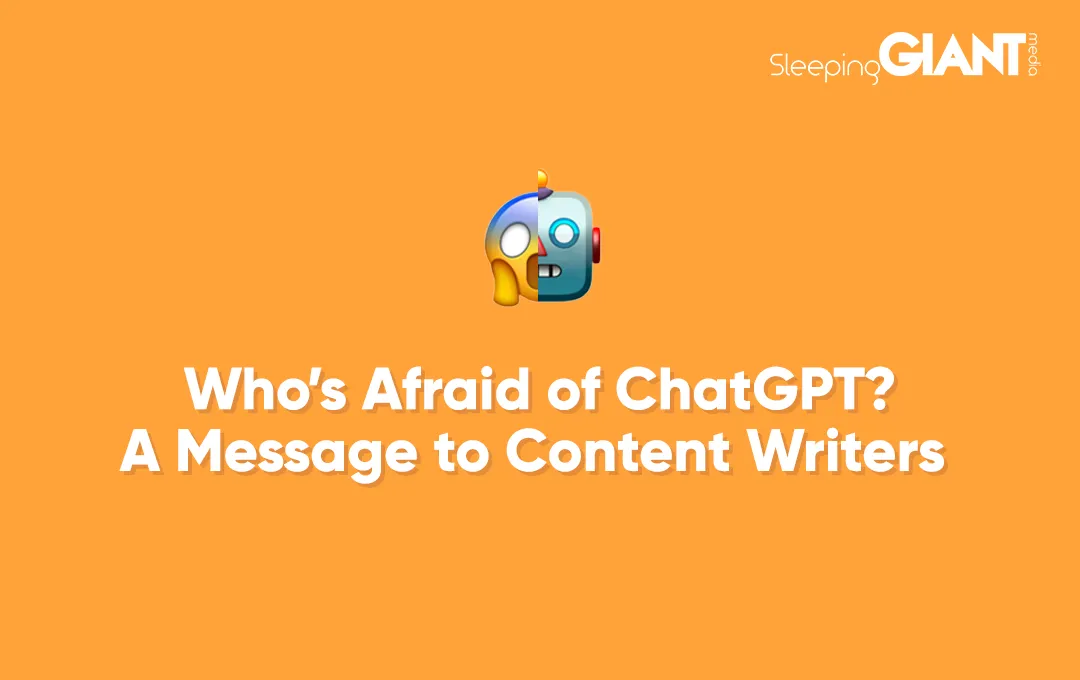
Who’s Afraid of ChatGPT? A Message to Content Writers
Being a content writer in 2023 feels, to some, already like a dying art. Like ancient craftspeople sharpening our tools for the last time. One only has to log in to LinkedIn before being bombarded with articles predicting the downfall of human-authored content in response to the rise of AI-powered tools.
As a content writer myself, I feel subliminal pressure to appear unflustered by the tool that’s coming for my job and to defend my position at the same time.
But, instead of doggedly insisting that no good can ever come from AI tools, or deeming them to be the next best thing (these two extremes being the usual clickbait go-to’s), I extend an invitation to content writers everywhere to join me in revelling in this period of uncertainty.
The ‘What-shall-we-do-about-this-then’ era could be our most productive yet — and strategic indecision can be a marvellous thing.
What should content teams be doing about Chat-GPT?
Scared, uncertain, confused… All words frequently sounding in the discourse about what AI tools mean for us. Equally, though, efficiency, speed, and innovation are also words that pop up.
The content team and I had the ‘We need to talk about this…’ meeting a few months back. You may well have had one recently too. We discussed what AI meant for us, if we could use it to streamline our content creation and ideation processes, and — of course — whether it was actually a threat to us yet or not.
Surprisingly, we all had different opinions. Here’s what the team had to say:
Rosie
Senior Digital Content Executive
“Like in any other industry, AI technology can help humans do their job better – but we’re not going anywhere. The difference between me and an AI is that I’m capable of thoughts, feelings, and experiences; these are all things that writers infuse into their work. I’m reluctant to join the ‘Will it replace content writers?’ argument that seems to be happening around AI because I think it’s reductive (and rooted in a capitalistic ‘production = value’ mindset, but that’s a conversation for another time…)
AI digests information that humans have put out there (and soon, it’ll digest information that AIs have put out there). It spits it back out in a new form. In both cases, this information can be wrong, biased, or just plain boring.
But it can also provide a sounding board – the thing about humans is we don’t have the ability to aggregate and understand hundreds of pages of information in a millisecond. This is where AI gets genuinely useful for content writers. Say you’re stuck in a rut and drawing a blank for content ideas — rather than trawling hundreds of pages for something potentially inspiring to write about, you can ask an AI. Or, if you need to quickly think about how a blog about X might be structured, it can help you understand how others have done it – and how you may (or may not) want to do it.”
George
Senior Digital Content Executive
“The primary work of a (worthwhile) content writer is to research, verify, reflect on, and articulate a problem or solution. So the question of how useful an AI tool is at speeding up these processes comes down to how much you can trust them to independently do any of these steps.
A tool can’t be trusted to accurately articulate something if it can’t be trusted to accurately reflect on something – that is, we need to know that the AI is able to actually understand something. The key issue here is that AI tools often give responses that indicate they ‘understand’ something but are actually just giving ‘the correct response to a given prompt’. Knowing that the opposite of “happy” is “sad” doesn’t mean you understand either of those states and how they relate to the rest of the world. They give correct-sounding responses because certain words usually follow others in a language – especially in the context of a prompted response. This isn’t useful.
You don’t know something just by knowing the words for it.
GPT-4 has shown great advancements in reasoning, but I think that actual understanding needs what AI researchers call “Grounding” – sensory experience and existence in the world you share with other sentient beings. If you only know that the state of being happy is the word “happy”, then your observations on situations and suggestions for improvement are meaningless until verified by someone who can be trusted. Without getting too into the problems of LLM-based AIs just outright lying all the time, relying on them to provide meaningful outputs essentially becomes a potluck.
What you’re left with is a research assistant who’s the equivalent of a very articulate 5-7 year-old pathological liar. Even if 3 of every 4 statements are verifiably correct, could you actually work with someone who’d make up information a quarter of the time?
So what about writing itself? You could feed it the raw information and it could worry about the language-ifying it, sure. But results I’ve found have been lacking. Again, without understanding, you can’t have writing that’s actually engaging, playful, fun, and worthwhile.
At this rate, I’m due to be proven wrong in 3-4 weeks but I don’t think Chat-GPT is going to replace genuine writing jobs. I think we’ll actually see the biggest use-case gains with prototyping code, data analysis/cleanup, and data visualisation. Once we can trust an AI to actually return the correct information 100% of the time (or give uncertainty statements), then we can likely start building bunkers.”
Liz
Senior Digital Creative Manager
“The rise of AI is just the latest in an ever-growing list of tools, trends and evolutions to the world of digital – which is part of the reason we love it, right? Disruption in marketing is happening constantly, and whatever you think about AI, the likelihood is that companies who don’t adapt and respond will be replaced by the companies that do.
I think the key is to stay open, and evaluate the ways that AI can help make your day job more efficient. Chat-GPT isn’t going to steal your job, but it can help to make you more effective at doing it – whether that’s time saving during research tasks, or helping craft outlines that you can then adapt. Just keep in mind that human review is essential; for now, at least, accuracy isn’t exactly AI’s strong suit, so fact checking and editing is the key superpower for us mere mortals.”
A combined approach of George’s confidence in our art, Rosie’s careful, detail-driven scepticism, and Liz’s willingness to give innovation a chance is a great stance to take.
How should content teams handle the issue of ChatGPT?
Opinions aside, though, what about actions? What can content teams and writers be doing during the period coming to be known as ‘the advent of AI’?
I’m still pushing the “Strategic indecision can be a marvellous thing” angle, don’t worry. But, let’s add some structure to it.
1. Get involved
Don’t shy away from discourse just because it’s a bit awkward. Yes, there’s now a tool that can technically do your job for free (irrespective of quality) and in a tenth of the time. So, address it.
Have difficult conversations. Give a comment. Especially for agencies, now is the time to demonstrate that these ripples are on your radar and that you’re aware of the benefits and opportunities these innovations offer. You want your clients to understand that these advancements are something familiar to you and that you are confronting and testing them with confidence.
2. Do your research
Familiarise yourselves with the tools that are being discussed. Sign up for free trials. If you have a team, start a collaborative doc together where you can share your thoughts and findings. The surveys and studies with the information you are looking for are all out there.
As an example, I’d recommend Mat Bennett’s research into the public perception & agency use of AI. I was lucky enough to watch him deliver this talk first-hand at BrightonSEO back in 2022 and it laid the foundational context behind the industry’s reception of AI very well.
Other useful resources include SEMrush’s State of Content Marketing Report for 2023 which allows you to see how other content marketers are integrating AI content tools into their efforts & processes. There’s also always LinkedIn groups and blogs like ours to dip in and out of too.
3. Take inspiration
Look around you. What are other content teams and writers doing? Ask others how they are responding to the advancements in AI technology. If you work for an agency, you have a whole office full of specialists to give comments. Are the SEO team trialling any tools in their keyword mapping, for example?
I spoke to Kelly, our Senior Technical SEO Lead about what our team was looking onto and she said:
“We’re investigating all sorts of different tools at the moment which can help us identify SEO issues and make jobs faster to do. For example, writing how to fix things in slide decks and then sense checking it. They are great for when you can’t think of how to word something.
Also, we’ve used tools to help us identify cannibalisation issues, page speed problems and how to fix them, write basic structured data, find code that I don’t know how to write, do regex queries, and loads more”
4. Test things
AI content tools can help you with ideating new ideas, writing organic social posts, putting together a structure for blogs, and so much more. But bear in mind that, if you are testing AI tools, you should:
– Be completely transparent
– Evaluate the pros and cons
– Edit and fact-check any content produced
– And, generally, don’t get too confident or complacent.
On that last point, when asked “How do we not get lazy when using ChatGPT?” in a webinar with Prowly Rebecca Moss said “Let the team have a play with it, while reiterating that they are the experts”. And that’s exactly it.
5. Have fun
As Liz said, part of the reason why we love AI is because it’s new and exciting and opens up new avenues of possibility. Doggedly writing off new approaches or asserting that the tools won’t help just because “that’s the way it’s always been” isn’t really an option anymore.
Try to see the fun in this new style of working and you might be surprised with the discoveries you make.
6. Remember your inherent value as a writer
Fundamentally, at this point in time, human-authored content is much more ‘helpful’. When taking Google’s content guidelines into account, ‘helpful’ content involves a degree of first-hand experience and originality that AI tools simply cannot fabricate.
- Does your content clearly demonstrate first-hand expertise and a depth of knowledge (for example, expertise that comes from having actually used a product or service, or visiting a place)?
And
- Is this content written by an expert or enthusiast who demonstrably knows the topic well?
Returning to George’s point about machine learning and understanding, Human content writers still pip AI to the post when it comes to knowledge, depth, and understanding — even if only because they know what ‘pipped to the post’ means and can use it correctly in a sentence…
Additionally, with the recent expansion of EAT into E-E-A-T (to include experience), original, human-authored content has never been more important and valuable.
Who’s afraid of ChatGPT?
So, in response to the question, “Who’s afraid of ChatGPT” we, as content writers will proudly announce: “Not us!”. Instead, we will innovate, explore, test the waters, and rise to the challenge!
For more strategic digital marketing content, browse the rest of our blog. Or, if you have a question about our range of SEO and Content services, get in touch with our team today.
Blog
Everything you Need to Know About the March Core Update
We knew it wouldn’t be long before Google released their first core update of...
Giant Wednesday
How To Optimise Images For Websites
Digital Marketing, technology & business insights, how-to's and explainer...
Follow Us
Sign Up For More
Stay up to date with the latest happenings, learnings, events & more with our GIANT Newsletters.
Contact Us
Top Floor, The Civic Centre, Castle Hill Avenue, Folkestone CT20 2QY.
Copyright © 2022 Sleeping Giant Media. All Rights Reserved.




